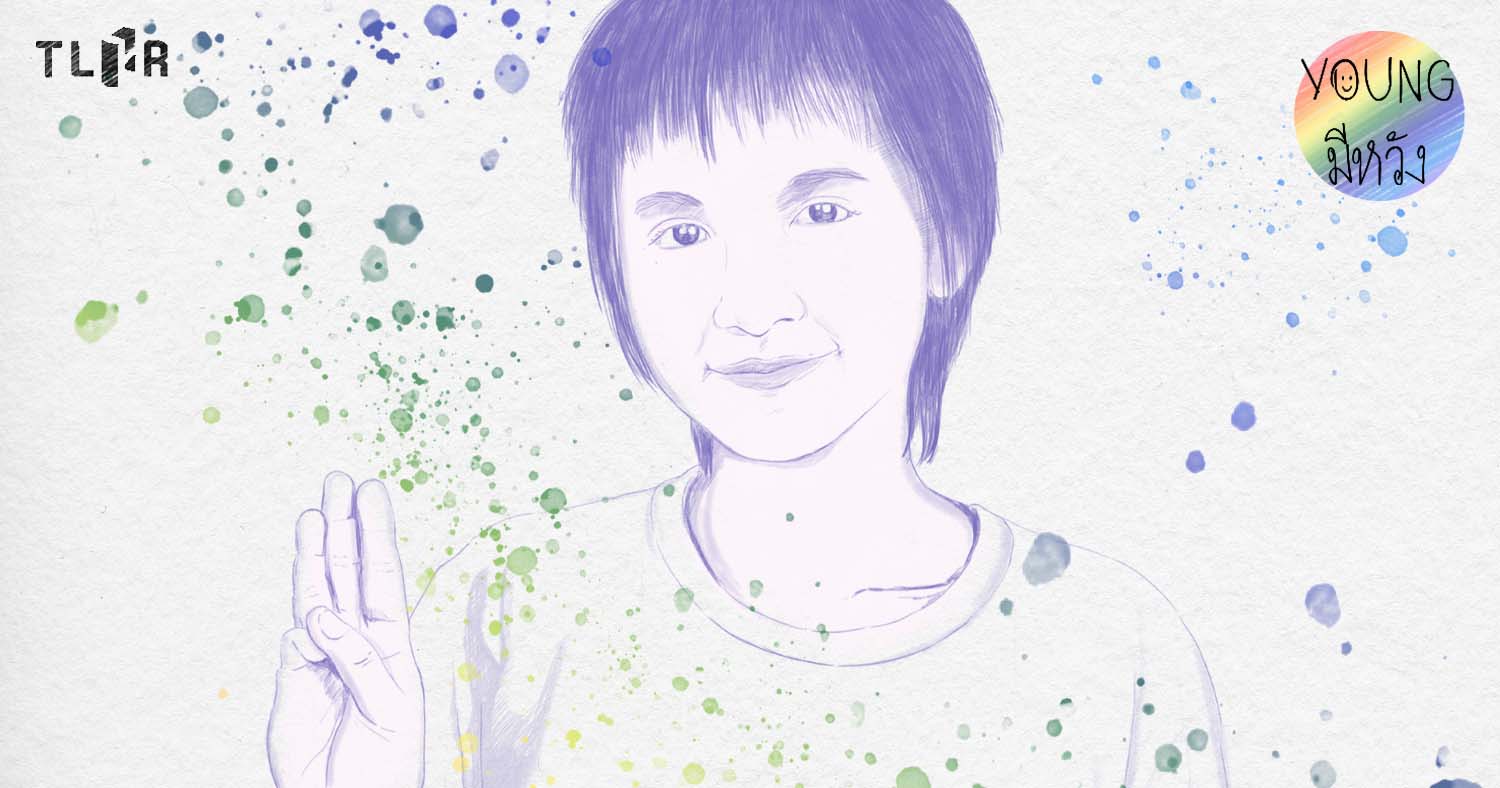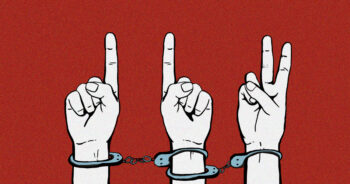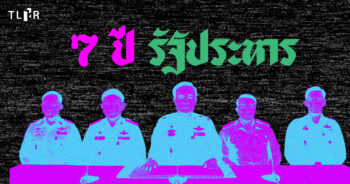“Mimi” is a 18-year-old feminist activist who is passionate about advocating for gender diversity. Since 2020, she has been participating in political demonstrations related to various socio-political issues. She has been charged with 6 political charges during her journey of activism. While participating in political activities, she has slowly discovered her passion. “Jai Foo” (Rising Hearts), a gender diversity initiative, was a starting point that led her to work on this issue seriously until she co-founded a group called “Fem Foo” (Rising Feminists).
Before Pride Month was over, TLHR had an opportunity to talk with Mimi about her story as a gender equality activist, the origin of her interests, the purpose of her work, and the hopeful messages she wants to send out. We believe that for those who are seeking to find themselves or those who are trying to figure out their gender, her story would lighten their heart and reinforce the feeling that they are not alone.
Prior to the Gender Movement
Mimi told us that she started her political activities with her heart and spirit. The disappearance of “Tar” Wanchalerm Satsaksit was her starting point. At that time, Mimi had moved from her hometown to live in Bangkok for less than a year and she was not familiar with the city. However, she felt that she could not sit by and do nothing. She said, “People disappeared right before your eyes. How could you expect me to stay still? I would have felt guilty to death.” As a result, at the age of 16, she tried to find a way to reach the Cambodian Embassy by herself, despite not knowing the city very well, and participated in the protest, calling on both the Thai and Cambodian governments to actively monitor and investigate on the case.
“The first protest I went to wasn’t a feminist one. It was a protest in front of the Cambodian Embassy on June 8th. The protest took four to five days after Wanchalerm’s disappearance,” Mimi recalled.
Between 2020 – 2021, there have been protests on a daily basis and Mimi tried to participate in every protest she could. In the beginning, she went alone. Then, she began to join various groups within the protests. Eventually, she became a volunteer for the women’s liberation group in which she became acquainted with senior feminist activists whom Mimi has a lot of admiration for. Dao (or “Wad Dao” Chutiphon Tangklieng), Pup, the Fem Liberation Group, Nam Tang Group, are of Mimi’s favorite idols.
Mimi told TLHR that while working on the issue of gender diversity, she had the opportunity to work on various issues as well such as education, labor, and economics. However, she felt exhausted as she took on the plethora of issues.
“I think it’s exhausting. It slowly tore my mind apart. So, I turned to solely work on the topic of gender and it refreshed my mind. Then, I decided to be at the forefront of the gender movement because I am more familiar with it than any other issue.”
The Passion for Gender Issues
When we asked her why she felt more familiar with gender issues, Mimi thought for a moment before replying, “Actually, I think this interest has been around since my childhood. I was not born into a Chinese family or a family that oppressed their child’s sexuality. However, I often saw my mother as the one being told what to do by my father. My father always oppressed her as well as myself. He always ordered me to pick stuff up for him, which I do not obey. Then when it’s time to do chores, my mother will use someone else but never my father. My mom says that my dad already works hard. For me though, I think that there shouldn’t be such a clear gender bias when it comes to doing house chores.”
Mimi also added that another part of her interest in gender issues stemmed from her experience with her father’s colleagues. “Well, when I was young, I was pretty used to the local politicians in one province in the Northeast because my father worked with those politicians. Every time they met, they would meet in pubs, bars, and restaurants that sell alcohol. I saw his friends harass those waitresses. I don’t know why but their behaviors stuck in my mind. To conclude, I started to become interested in feminism during 2018-2019. I started to learn about feminism and I am still learning.”.
The Birth of “Sita on Fire” – a Space for Survivors
Mimi started her role as a gender activist by volunteering for the Fem Liberation Group where she performed a symbolic act “Sita on Fire”.
Mimi recalled the origin of this show, “It started with a video from Chile called ‘A rapist in Your Path’ being sent from a member of the group into our group chat. After watching the video, we thought we would like to see something like this in Thailand and so everyone was trying to come up with the lyrics. Dao said that the lyrics should be about Sita because she had to prove her innocence by undergoing a fire ordeal. Therefore, for this show, we must give credit to the Fem Liberation Group that helped compose the lyrics.”
Mimi continued by saying,“Actually, when ‘Sita on Fire’ went viral. It became controversial on many platforms. Some say the lyrics were boring, but I chose not to read them. We insisted that the song needs to empower survivors. We don’t care if it’s boring. The main purpose of the song was to empower survivors. The purpose was to tell them that they have not sinned, and the rapist is the guilty one.”
In addition, as one of the performers of ‘Sita on Fire’, Mimi felt that such a show fulfilled her heart, especially when she knew that it became the song that empowered survivors to want to exercise their rights, at least on online platforms such as Twitter. “It can be said that the ‘Sita on Fire’ performance fulfilled our hearts” Mimi repeated.
Mimi felt that her act as well as her friends’ could be called a cultural fight, especially the ‘Sita on Fire’ performance. She believes that Thai people are trapped under patriarchal beliefs and adhere to rape culture, often placing the blame on survivors (this is also known as “victim blaming”).
“For me, I think that these beliefs are firmly embedded in our society, it is an internalization of rape culture. If you ask me: are those people wrong to have such patriarchal beliefs? I would say that they are not all to be blamed as various institutions in society are also at fault for reinforcing these beliefs. For example, the media or TV dramas convey a lot of these messages as they often romanticize rape and sexual conduct.”
“These beliefs have a magnitude of influence on various other institutions and organizations – the monarchy, the law, the religion, the policymakers, and the media, everything. This means that there are patriarchal elements in all of the spaces, influencing people’s minds and society. It has become a deeply rooted belief and establishes gender bias.”
Mimi also talked about her and her friends’ roles as feminist activists. “We are trying to solve these problems in society. If society is free from gender bias, our group probably wouldn’t even be established. Nevertheless, when society encounters problems, we must act. We must let them know what gender bias is and its harmful consequences on society.
“The first and most important thing is we must first recognize that that the problems exist. This took quite a lot of learning for me to realize. In the beginning, people usually started learning about gender issues because they feel that something isn’t right, but usually, they still don’t actually know what those things really are yet.”
“For me, I had a better understanding after going through the process of learning from older Feminists. I think it is necessary for Thai society to clearly understand what violence is. When violence happens, we need to know what it is and how it happened. For example, we must understand the definitions – what sexual assault is or what sexual harassment is.”
Despite calling herself a feminist activist, fighting for gender equality, Mimi sees that in reality, we can all make mistakes. However, when we make mistakes, we must learn from them and move forward. Mimi firmly believes that gender equality and gender diversity are important parts and the foundations of a strong democracy.
“Regardless of what happens, people like us who identify as LGBTQ+ already exist, so no one can erase our identity and our gender and sexuality,” Mimi reiterated in a firm tone.
Founding ‘Fem Foo’ and Inviting Friends into the “Throw Up Club”
Currently, Mimi told TLHR that she and her friends have formed a movement, working on gender equality and gender diversity under the name ‘Fem Foo.’ She told us about the group’s background: It is a gathering of youths and the public; they may not be full-time activists, but they want to host activities together. Thus, most of the activities under Fem Foo aim to create a safe and healing space for those exploring their sexual identities.
“I talked to my friends and started to form the group. Then, we created a Twitter account, but we were inactive on Twitter for months. We did nothing because we were working on other issues such as labor, education, and economic issues. I cannot even remember when we are starting to become serious about ‘Fem Foo’ (laughs)”
“At first, my friend and I intended to launch Fem Foo as a platform to distribute information about gender issues, to tell the history or anything academic about gender equality and gender diversity. However, recently ‘Fem foo’ has been accepting volunteers, and it became a political movement.” Mimi said.

As for founding Fem foo, Mimi said, “Fem Foo was initiated when my friend’s lives were difficult. As I told previously, all my friends are youths, and they are not activists, but they want to host activities. They are not ready to put all their heart into it, we are just a group of friends who are interested in gender issues. We are not brave enough; therefore, most of our work is not strategic or planned. What we do is what we actually call a ‘Throw Up Club’.”
Mimi described the ‘Throw Up Club’ as something that is done among friends every month to heal each other. It is called the ‘Throw Up Club’ because we want it to be a safe space that allows everyone to vent out their problems, regardless of whether they are about family, social or political issues.
“We call it the ‘Throw Up Club’, but to be honest, in a better language, it’s more like a deep listening group. The ‘Throw Up Club’ makes our friends feel safe and leads them to join Fem foo.”
For the activities under Fem Foo, Mimi said that she and her friends recently organized a booth at the Youth Pride Thailand event held at the Bangkok Art and Culture Center on June 11th, 2022, under the theme “Identity and Pride”. The activities included painting fabric bags and gingerbread.



“I think the values of Fem Foo activities are that they not only healed the outsiders who passed by and joined, they also healed the insiders who participated too. When we went to do the activities together, a friend of mine told me that once they started painting and saw other people doing it together, it made them feel happy. So, I think that Fem Foo should continue activities in which everyone can help and heal each other” Mimi said.
Mimi emphasized the key purpose of Fem Foo, which is to reinforce that the democratic space should be a place where people can discover themselves in a safe space. Fem Foo aims to create a safe space for people to explore their sexual identity. Fem Foo’s activities are therefore designed in pastel shades, such as the painting of bags and gingerbread.
“We are using something cute for the exploration of oneself because we think that it encourages people to not feel afraid to be themselves under democracy. Thus, we intend to create these safe spaces. Moreover, we think there is already enough violence in society, so we created the “Throw Up Club” to let everyone vent out their problems. ociety never listens to us, they never let us speak. It only commands us to listen.”
Last but not least, on this year’s Pride Month, Mimi has something she wants to communicate to a society where gender diversity is still not fully accepted: “Diversity is natural. The scientific knowledge that states that there are only two biological sexes and patriarchal ideals that are engrained into our society is sexual segregation – gender discrimination of which gender is better. Our society accepted these ideas. Therefore, I want to communicate that we can gently review our prejudices and bias. There’s a lot to learn about gender equality and gender diversity. All we need, as people with gender diversity or non-binary, is to be heard and accepted in society.”
In addition, Mimi wants to communicate with people who are still exploring their gender identities and those who are still afraid to show their gender identities,
“We don’t have to feel guilty when we are afraid or don’t feel confident because it is society’s fault for not being accepting and for making it suffocating for us to exist. We can still explore ourselves gently. What society wants is to make us feel empty. Society values us only if we are a good person or if we have won materialistic rewards. However, our internal values are that we know who we are, and understanding our own gender identity, which, society may not value, but we do. So I think that what they are facing is not wrong. Often times I blamed myself until I joined the feminism world. Then, my world changed. In this feminist world, there are many people working on education as well as other topics, to show that you are not alone” Mimi concluded.



